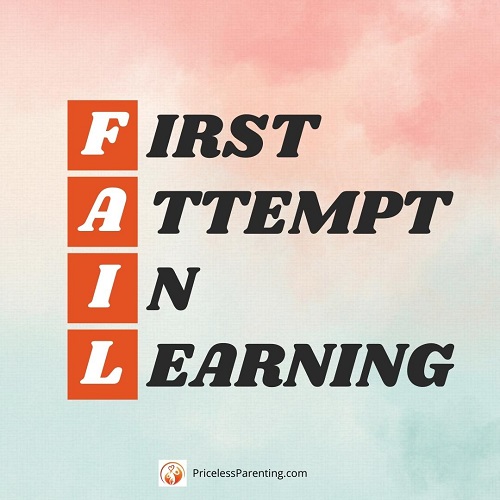Teaching Kids How to Fail Successfully
by Kathy Slattengren, M. Ed., Priceless Parenting (sign up for monthly parenting newsletter and receive 20+ printable charts for kids and parents)

Making mistakes is part of being human. Although you may hate making mistakes, simply participating in life guarantees plenty of opportunities for mistakes.
How do you handle yourself when you’ve made a mistake? How do you react to your children when they’ve made a mistake? The way you handle mistakes and teach your children to handle mistakes is the difference between growing in confidence and shrinking back.
Low Self-Esteem Response to Mistakes
Children with low self-esteem will beat themselves up when they make a mistake. The mistake might be something as minor as mispronouncing a word while reading aloud, getting an answer wrong on a test or missing catching the ball.
You may hear them say things like:
- “I’m stupid.”
- “I’ll never get this right.”
- “I should have known that answer.”
- “I hope I don’t mess up again.”
Instead of wanting to try again, these kids may prefer avoiding the situation. They might want to quit the team, not go to
school or drop out of the play. They would rather not participate than risk the feelings of anxiety and shame.
They may also make
choices to avoid being criticized, ridiculed or rejected. For example, they may not turn in a homework assignment because having
a low grade for not turning it in is less painful than turning it in and having the teacher criticize their work.
Unfortunately, kids with low self-esteem also care immensely about what others think of them. Teens may turn to anonymous web applications to find out what their “friends” think about them. This is an especially dangerous route since anonymous sites are riddled with cruel comments.
They continue to make themselves feel bad by focusing on what they don’t have rather than what they do have. They might focus on how they are not as beautiful or good at math as someone else. They forget to focus on their good qualities like being kind, honest and a good friend.
High Self-Esteem Response to Mistakes
Kids with high self-esteem also make mistakes but they handle them in healthier ways. They think about what went wrong and what they might do differently in the future.
You might hear them say things like:
- “That’s not how I expected it to work. What went wrong?”
- “If I spend more time practicing, I think I’ll do better next time.”
- “Oh, I see what I did wrong.”
They see mistakes as learning experiences. They figure out what needs to be done to get a different result the next time.
This resilience gives them confidence to move on from mistakes and try again. By staying focused and positive, they reach success more quickly than the kids who are beating themselves up.
They help themselves feel good by remembering their good qualities. They keep in mind things like they have determination, a sense of humor and are trustworthy.
Responding to Your Kids’ Mistakes
Underneath it all, your kids want to please you. Your disapproval is a huge weight on their shoulders. Your response to your kids’ mistakes can improve their self-esteem or further damage it.
What are responses will help build their self-esteem?
- Asking open ended questions that guide them to figuring out how to make amends for their mistake.
- Reminding them that they are smart and you believe they can find a solution.
- Letting them know that you trust they will solve this problem.
- Talking about people like Thomas Edison who said while trying to invent the light bulb “I have not failed. I've just found 10,000 ways that won't work.”
- Acknowledging their effort even if the results fell short of their expectations.
When you encourage self-compassion, your kids are more likely to grow from their mistakes instead of shrink back. If you can also model self-compassion when you make a mistake, your kids will internalize that positive response.
If you want your kids to have big ideas, they are going to have to be comfortable with failing. It’s what they do with that failure that matters. How are you teaching your kids to respond to their failures?